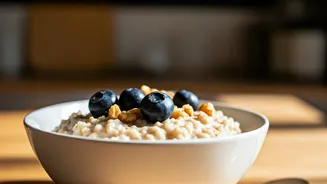Oats: A Primer
Oats are a whole-grain food that provides essential nutrients. They are rich in soluble fiber, especially beta-glucan, which contributes significantly
to various health advantages. Oats can be consumed in various forms, including rolled oats, steel-cut oats, and oat bran, with each offering a different texture and cooking time. The versatility of oats makes them an easily adaptable ingredient for breakfast, lunch, or even dinner. Oats are also gluten-free, although they are often processed in facilities that also handle wheat, so individuals with severe gluten sensitivities should seek out certified gluten-free options. The nutritional profile of oats includes carbohydrates, fiber, protein, and a range of vitamins and minerals like iron and magnesium.
Heart-Healthy Benefits
One of the most celebrated benefits of oats is their positive impact on heart health. The beta-glucan fiber found in oats has been proven to help reduce LDL cholesterol levels, often referred to as 'bad' cholesterol. By lowering LDL cholesterol, oats can reduce the risk of heart disease. Furthermore, oats can help improve overall cardiovascular function by regulating blood pressure. Including oats in your regular diet is a simple yet effective strategy to maintain a healthy heart. Studies show that consuming as little as 3 grams of soluble fiber from oats daily can significantly reduce the risk of heart disease. The American Heart Association recommends that people incorporate oats into a heart-healthy diet.
Blood Sugar Control
Oats play a significant role in managing blood sugar levels, making them a beneficial choice for individuals with diabetes or those at risk. The soluble fiber in oats slows down the absorption of sugar from the digestive tract, preventing rapid spikes in blood glucose levels. This steady release of sugar helps maintain more stable energy levels throughout the day and reduces the likelihood of insulin resistance. Incorporating oats into the diet can help improve insulin sensitivity and manage blood sugar levels. Many healthcare professionals recommend oats as part of a diabetes-friendly meal plan. Regular consumption can also help prevent the onset of type 2 diabetes by promoting improved glycemic control.
Weight Management Aid
For those aiming to manage their weight, oats can be a valuable ally. The high fiber content of oats contributes to a feeling of fullness, which can help control appetite and reduce overall calorie intake. Consuming oats can promote satiety, leading to fewer cravings and smaller portion sizes throughout the day. The slow digestion of oats also helps to keep you feeling fuller for longer. This property makes them an excellent choice for a healthy breakfast, supporting weight management goals. Studies suggest that regularly consuming oats can lead to significant weight loss and improved body composition over time. Oats offer a healthy and filling way to support weight loss efforts, particularly when combined with a balanced diet and regular exercise.
Easy Dietary Addition
Adding oats to your diet is incredibly straightforward. They can be prepared in various ways to suit individual tastes and preferences. Oatmeal, made from rolled oats, is a classic breakfast choice that can be customized with fruits, nuts, and seeds. Steel-cut oats offer a chewier texture and take longer to cook, making them ideal for those who prefer a more substantial meal. Oat bran can be added to smoothies or baked goods to boost fiber intake. Oats can also be incorporated into savory dishes, such as oat-based bread or as a thickening agent in soups and stews. Whether you prefer a quick breakfast or a more elaborate meal, there are numerous ways to enjoy the health benefits of oats.












